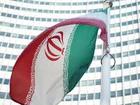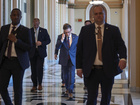Spotlight
The ceasefire that ended Iran's 12-day war with Israel has held for nearly a month without incident, but many Iranians remain uneasy, struggling with uncertainty as fears of another confrontation linger.
 Full Story
Full Story
Iran has no plans to abandon its nuclear program including uranium enrichment despite the "severe" damage caused by U.S. strikes to its facilities, the country's foreign minister said ahead of renewed talks with European powers.
 Full Story
Full Story
Russia is open to peace with Ukraine, but achieving its goals remains a priority, Kremlin spokesman Dmitry Peskov said Sunday, days after U.S. President Donald Trump gave Moscow a 50-day deadline to agree to a ceasefire or face tougher sanctions.
 Full Story
Full Story
Russia unleashed one of its largest aerial assaults on Ukraine in recent months, only hours before the U.K. and Germany chaired a meeting to discuss U.S. President Donald Trump's plans for NATO allies to provide Ukraine with weapons.
 Full Story
Full Story
Tehran on Monday blamed European powers for the failure of the 2015 nuclear deal, accusing them of breaking commitments ahead of renewed talks in Istanbul with Britain, France and Germany.
 Full Story
Full Story
Tehran said it will host China and Russia on Tuesday for talks on its nuclear program, amid European threats to reimpose sanctions.
"A trilateral consultation" with Russia and China would be held in the Iranian capital to discuss nuclear issues and the potential reimposition of sanctions, foreign ministry spokesman Esmail Baqaei told a news conference on Monday.
 Full Story
Full Story
The House gave final approval to President Donald Trump's request to claw back about $9 billion for public broadcasting and foreign aid early Friday as Republicans intensified their efforts to target institutions and programs they view as bloated or out of step with their agenda.
The vote marked the first time in decades that a president has successfully submitted such a rescissions request to Congress, and the White House suggested it won't be the last. Some Republicans were uncomfortable with the cuts, yet supported them anyway, wary of crossing Trump or upsetting his agenda.
 Full Story
Full Story
German Chancellor Friedrich Merz said Friday that his coalition has a "stable foundation" and has achieved a lot in its first 10 weeks, but acknowledged that "occasional setbacks" are a risk in government as his administration struggles with its first major dispute.
Merz took office on May 6, leading a coalition of his conservative Union bloc with the center-left Social Democrats that has a relatively thin parliamentary majority. He vowed to strengthen Europe's biggest economy after years of stagnation, enable Germany to build Europe's strongest conventional army and keep the U.S. on board with aid to Ukraine.
 Full Story
Full Story
Brazil's former President Jair Bolsonaro has been ordered to wear an ankle monitor, his press office said on Friday.
The development came as federal police conducted searches at his home and his party's headquarters in Brasília, according to people familiar with the court order.
 Full Story
Full Story
The European Union and Britain on Friday ramped up pressure on Russia over its war on Ukraine, targeting Moscow's energy sector, shadow fleet of aging oil tankers and military intelligence service with new sanctions.
"The message is clear: Europe will not back down in its support for Ukraine. The EU will keep raising the pressure until Russia ends its war," EU foreign policy chief Kaja Kallas said after the bloc agreed its new measures, including a new oil price cap.
 Full Story
Full Story




